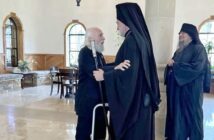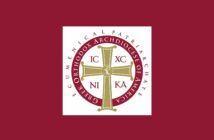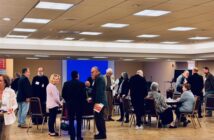Source: Orthodox Christian Laity
The 32nd Annual Meeting of Orthodox Christian Laity (OCL) in Houston was historic, especially considering the thoughtful message delivered by His Eminence, Metropolitan Isaiah of Denver.
PRESENTATION AT OCL CONVENTION Houston, Texas
November 2019
Having served the Church for almost sixty years, thirty-three of them as a bishop, I have experienced different perspectives concerning our Church in the United States. Historically, it was the Russian Orthodox Church which sent clergy into our nation as early as 1900, shortly after Alaska had been part of the Russian Empire. It was Archbishop Tikhon who established the Saint John the Baptist Greek Orthodox parish in Pueblo, Colorado in 1906, as well as a Russian Orthodox parish in the same city. It was he who visited the Saint Nicholas parish at ground zero in New York City a little later and influenced Tsar Nicholas of Russia to donate a solid silver icon screen which covered the wooden structure. Having died in prison under the communists in the former Russian Empire, he has been designated as a saint by his Church, who is also honored in our jurisdictions.
Greek Immigrants who began coming to the United States in the late 1800s and early 1900s established parish communities even before any Greek Orthodox clergy had migrated to America. It was Ecumenical Patriarch Athenagoras as Archbishop from 1931 to 1948 who ordained pious men as priests of the parishes which requested them. I grew up in such a parish in New Hampshire.
Before Archbishop Athenagoras went to Constantinople as Ecumenical Patriarch, he had visited every existing Greek Orthodox parish in this country. He strengthened the larger parishes with many families during the beginning of the Great Depression by establishing the Ladies Philoptochos Society in 1931 as an independent philanthropic organization to help victims of the Depression.
During those former years, even before the time of Athenagoras, there was a double standard in our parishes in America based on our apostolic faith as well as Greek ethnicity. This created confusion, if not animosity, a problem which began in the 1920s with the Vasilikoi and the Venizelikoi. This was a time when the politics in Greece affected some of the parishes in the United States by those who preferred to see Greece as a republic and not as a kingdom, which was influenced by the government of England and King Othon, its first king. In one New Hampshire city, there were two Greek parishes — one was in honor of the king and the other in honor of Venizelos, located a few hundred yards from each other. Later, it was Archbishop Iakovos who was attacked by the two leading Greek newspapers in New York, The Atlantis and The National Herald, for attempting to get rid of the Greek language. I remember very well when at a clergy meeting in New York in the late 1960s, Archbishop Iakovos told us: “Look at the congregation and use as much English as is necessary in the services,” which was, of course, contrary to the attacks by the Greek newspapers.
Today, we do have remnants of the past. But fortunately, many faithful Orthodox Christians using the virtue of agape-love are striving to resolve the problem, such as this Orthodox Christian Laity ministry.
However, allow me to say that all efforts at bringing all the Orthodox jurisdictions together should first continue with pan-Orthodox gatherings, such as the Sunday of Orthodoxy and the name day celebrations of parishes as pan-Orthodox events. For us to jump ahead and to succeed in bringing all the canonical jurisdictions together with written documentation will not be successful. It is a bit too early. I publicly confess that I have not attended some meetings of the Assembly of Canonical Orthodox Bishops of the United States, because I beheld hierarchs just sitting at the meetings with no apparent interest or participation. True, some criticized the former chairman who they say displayed no interest in the purpose of the Assembly. Others criticized hierarchs born in Europe who still persisted in having closer ties with their European counterparts.
Before anyone here develops any negative feelings as to the purpose of the Assembly of Canonical Orthodox Bishops in America with what I am saying, I rest my feelings on the presence of the Holy Spirit Who our Lord Jesus Christ states, that He, the Holy Spirit, will be with the Church after His Ascension, reminding the Apostles and their descendants of everything our Lord said and did, and Who will be with His Church even to the glorious day He returns to gather His people for His eternal Kingdom. On the basis of the words of the Lord, I do believe that our canonical jurisdictions will begin to blend together in Orthodox programs, including retreats by different age groups, as well as recognizing each other as spiritual members of the One Holy Body of Christ, consisting of all of us as members of the One divine family.
+Metropolitan Isaiah of Denver




1 Comment
Metro. Isaiah is the best , most faithful, and most reliable bishop in the GOA, and now he has been drinking the Koolaid; witness his statement that “It’s a bit too early” to bring all the canonical jurisdictions together. Please!
“It’s a bit too early” to expect the Church to actually respect and comply with the Holy Canons which have mandated the “one bishop, one city” principle since the very first Ecumenical Council.
“It’s a bit too early” for bishops to do what they are canonically required to do, i.e., form a Synod and hold each other accountable for their words and actions.
Indeed, how can such organizations continue to claim to be “canonical” when they brazenly operate outside the clear teachings of the canons, and yet expect the faithful to respect the canons that govern their daily lives?
Apparently he and most of the other American Orthodox bishops are such clever strategic planners that their sense of appropriate timing should take precedence over following the clear direction of the Head of the Church, as revealed through the Holy Canons.